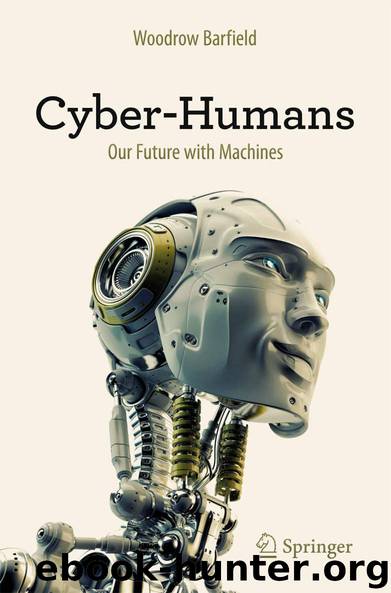Cyber-Humans: Our Future with Machines by Woodrow Barfield

Author:Woodrow Barfield [Barfield, Woodrow]
Language: eng
Format: epub
Publisher: Springer International Publishing
Published: 2015-12-16T23:00:00+00:00
Prosthesis , Implants and Law
Many who have reservations about the cyborg future, often advocate for appropriate government regulations and statues to protect those who have become enhanced with technology. In the future, advances in neuroscience and robotics will change the way that society views the human body, reinforcing the concept of the body as a machine with interchangeable, replaceable, and upgradeable parts. As these cyborg technologies become more advanced, they will approach and then surpass ordinary human function, rising the prospects of enhancing human capabilities well beyond the current baseline standard; this may lead society to view the healthy, yet unenhanced human as disabled.21 Therefore, in the cyborg future, the disabled, equipped with cyborg technology, may prove more “abled,” and average abilities could become almost akin to defects, in need of elimination. With these possibilities in mind, this section gives the reader a flavor of what I think is part of a developing field of cyborg law.
Numerous cases of discrimination against those equipped with “cyborg technology” revolve around employment disputes and in the U.S. are brought forward by the Equal Employment Opportunity Commission (EEOC) . One such case involved a woman who was terminated because she had a prosthetic leg and her employer was concerned she would be “knocked down” at work due to her disability.22 The case, which was won by the woman, was decided under the American with Disabilities Act (ADA) which prohibits discrimination against people with disabilities in employment.23 The court ruled that it was illegal to fire a disabled employee due to a baseless fear they may injure themselves or others. Another employment dispute with implications for a “cyborg law,” dealt with a person equipped with a hand prosthesis, and was brought under the Rehabilitation Act of 1973.24 In this dispute a veteran who had lost his hand and replaced it with a prosthesis , was dismissed from the FBI academy because they alleged that during his training he could not safely fire a handgun with his prosthesis. However, a jury finding that the FBI instructors at the academy were hostile toward the veteran, ruled in his favor and the court awarded him monetary damages, back pay, and reinstatement to the FBI academy. The statue used for this “cyborg discrimination case,” deals with federal jobs and federal agencies, and thus does not cover discrimination against those with prosthesis in other situations; this seems like an area ripe for legislation.
Another case with implications for cyborg law was heard in 1999 by the U.S. Supreme Court and involved the issue of whether a person with a corrected disability would still be considered disabled under the ADA.25 This is an interesting case for “cyborg law” given the aim of becoming equipped with technology (i.e., becoming a cyborg) is often to restore, or go beyond, normal human abilities. The case involved twin sisters who suffered from acute visual myopia. When they applied to United Airlines for a job as a commercial pilot, they met the requirements for employment except for the vision requirement which was uncorrected visual acuity of 20/100 or better.
Download
This site does not store any files on its server. We only index and link to content provided by other sites. Please contact the content providers to delete copyright contents if any and email us, we'll remove relevant links or contents immediately.
The Secret History by Donna Tartt(19088)
The Social Justice Warrior Handbook by Lisa De Pasquale(12190)
Thirteen Reasons Why by Jay Asher(8909)
This Is How You Lose Her by Junot Diaz(6886)
Weapons of Math Destruction by Cathy O'Neil(6279)
Zero to One by Peter Thiel(5801)
Beartown by Fredrik Backman(5754)
The Myth of the Strong Leader by Archie Brown(5507)
The Fire Next Time by James Baldwin(5444)
How Democracies Die by Steven Levitsky & Daniel Ziblatt(5218)
Promise Me, Dad by Joe Biden(5153)
Stone's Rules by Roger Stone(5087)
A Higher Loyalty: Truth, Lies, and Leadership by James Comey(4962)
100 Deadly Skills by Clint Emerson(4925)
Rise and Kill First by Ronen Bergman(4788)
Secrecy World by Jake Bernstein(4753)
The David Icke Guide to the Global Conspiracy (and how to end it) by David Icke(4717)
The Farm by Tom Rob Smith(4507)
The Doomsday Machine by Daniel Ellsberg(4490)
